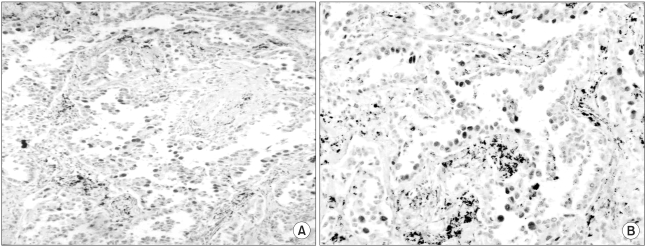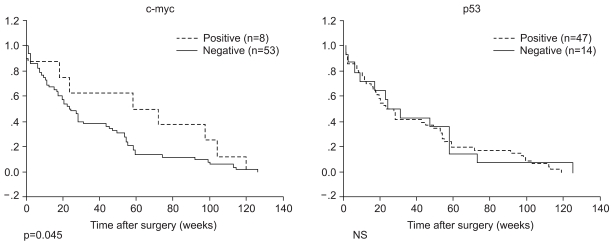Cancer Res Treat.
2004 Apr;36(2):146-150.
The Expression of c-myc, bcl-2 and p53 Proteins in Adenocarcinomas of Lung
- Affiliations
-
- 1Department of Pathology, St Vincent's Hospital, Catholic University, Suwon, Korea. sjkang@vincent.cuk.ac.kr
Abstract
- PURPOSE
c-myc, bcl-2 and p53 are known to regulate apoptosis. There has been growing interest in analyzing their contribution to the pathogenesis and prognosis in a variety of human cancers. This study was undertaken to investigate the expression of these proteins in pulmonary adenocarcinomas and to determine their relationship with clinicopathologic parameters and survival. MATERIALS AND METHODS: Archival tumor tissues from 61 patients with adenocarcinoma of lung were analyzed by immunohistochemistry for the expression of c-myc, bcl-2 and p53 proteins. Clinical information was obtained through the computerized retrospect database from the tumor registry. RESULTS: Of 61 patients, 32 were men and 29 women with the median age 63 years. 4 had stage I disease, 2 had stage II disease and 55 had stage III disease. The expression of c-myc protein was identified in 13% (8/61) tumors, bcl-2 protein was detected in 1.6% tumors (1/61) nd p53 was detected in 77% (47/71) tumors. The association of the expression of c-myc, bcl-2 and p53 was not detected. The survival time was longer in patients expressing c-myc protein than in patients without the c-myc protein expression (p=.045). Neither bcl-2 nor p53 showed the correlation to clinicopathologic variables. CONCLUSION: Our data suggest the involvement of p53 alteration in the pathogenesis of lung adenocarcinoma. The c-myc expression in some tumors indicates that c-myc alone may not contribute critically to the development and/or the progression of these tumors. It, however, correlated to the survival time, suggesting the c-myc expression as a favorable prognostic factor possibly through the apoptosis pathway.
Keyword
Figure
Reference
-
1. Kerr JF, Winterford CM, Harmon BV. Apoptosis. Its significance in cancer and cancer therapy. Cancer. 1994; 73:2013–2026. PMID: 8156506.
Article2. Wyllie AH. Apoptosis. Br J Cancer. 1993; 67:205–208. PMID: 8431353.3. Barr LF, Campbell SE, Diette GB, Gabrielson EW, Kim S, Shim H, Dang CV. c-myc suppresses the tumorigenicity of lung cancer cells and down-regulates vascular endothelial growth factor expression. Cancer Res. 2000; 60:143–149. PMID: 10646866.4. Prins J, De Vries EG, Mulder NH. The myc family of oncogenes and their presence and importance in small-cell lung carcinoma and other tumor types. Anticancer Res. 1993; 13:1373–1385. PMID: 8239508.5. Johnson BE, Ihde DC, Makuch RW, Gazdar AF, Carney DN, Oie H, Russell E, Nau MM, Minna JD. Myc family oncogene amplification in tumor cell lines established from small cell lung cancer patients and its relationship to clinical status and course. J Clin Invest. 1987; 79:1629–1634. PMID: 3034978.
Article6. Gosney JR, Field JK, Gosney MA, Lye MD, Spandidos DA, Butt SA. C-myc oncoprotein in bronchial carcinoma: expression in all major morphological types. Anticancer Res. 1990; 10:623–628. PMID: 2164348.7. Volm M, Rittgen W, Drings P. Prognostic value of ERBB-1, VEGF, cyclin A, FOS, JUN, and MYC in patients with squamous cell carcinomas. Br J Cancer. 1998; 77:663–669. PMID: 9484827.8. Yonish-Rouach E, Resnitzky D, Lotem J, Sachs L, Kimchi A, Oren M. Wild-type p53 induces apoptosis of myeloid leukaemic cells that is inhibited by interleukin-6. Nature. 1991; 352:345–347. PMID: 1852210.
Article9. Shaw P, Bovey R, Tardy S, Sahli R, Sordat B, Costa J. Induction of apoptosis by wild-type p53 in a human colon tumor-derived cell line. Proc Natl Acad Sci USA. 1992; 89:4495–4499. PMID: 1584781.
Article10. Ragimov N, Krauskopf A, Navot N, Rotter V, Oren M, Aloni Y. Wild-type but not mutant p53 can repress transcription inhibition in vitro by interfering with the binding of basal transcription factors to the TATA motif. Oncogene. 1993; 8:1183–1193. PMID: 8479742.11. Reisman D, Elkind NB, Roy B, Beamon J, Rotter V. c-myc transactivates the p53 promoter through a required downstream CACGTG motif. Cell Growth Differ. 1993; 4:57–65. PMID: 8494784.12. McDonnell TJ, Marin MC, Hsu B, Brisbay SM, McConnell K, Tu SM, Campbell ML, Rodriguez-Villanueva J. The bcl-2 oncogene: apoptosis and neoplasia. Radiat Res. 1993; 136:307–312. PMID: 8278571.
Article13. Bissonnette RP, Echeverri F, Mahboubi A, Green DR. Apoptotic cell death induced by c-myc is inhibited by bcl-2. Nature. 1992; 359:552–554. PMID: 1406975.
Article14. O'Neill AJ, Staunton MJ, Gaffney EF. Apoptosis occurs independently of bcl-2 and p53 over-expression in non-small cell lung carcinoma. Histopathology. 1996; 29:45–50. PMID: 8818693.15. Pezzella F, Turley H, Kuzu I, Tungekar MF, Dunnill MS, Pierce CB, Harris A, Gatter KC, Mason DY. bcl-2 protein in non-small cell lung carcinoma. N Engl J Med. 1993; 329:690–694. PMID: 8393963.16. Gaffney EF, O'Neil AJ, Staunton MJ. bcl-2 and prognosis in non-small cell lung carcinoma. N Engl J Med. 1994; 330:1757–1758. PMID: 8190145.17. Anton RC, Brown RW, Younes M, Gondo MM, Stephenson MA, Cagle PT. Absence of prognostic significance of bcl-2 immunopositivity in non-small cell lung cancer: Analysis of 427 cases. Hum Pathol. 1997; 28:1079–1082. PMID: 9308733.
Article18. Corrin B, editor. Pathology of the lungs. 2000. London: Churchill Livingstone.19. Yoo J, Kang SJ, Ahn WS, Kim BK. E-Cadherin expression and p53 alterations in soft tissue sarcomas: a possible role in epithelial differentiation. Cancer Res Treat. 2001; 33:343–349.
Article20. Spencer CA, Groudine M. Control of c-myc regulation in normal and neoplastic cells. Adv Cancer Res. 1991; 56:1–48. PMID: 2028839.
Article21. Slebos RJ, Rodenhuis S. The molecular genetics of human lung cancer. Eur Respir J. 1989; 2:461–469. PMID: 2547647.22. Volm M, Efferth T, Mattern J. Oncoprotein (c-myc, c-erbB1, c-erbB2, c-fos) and suppressor gene product (p53) expression in squamous cell carcinomas of the lung. Clinical and biological correlations. Anticancer Res. 1992; 12:11–20. PMID: 1348920.23. Sikora K, Chan S, Evan G, Gabra H, Markham N, Stewart J, Watson J. c-myc oncogene expression in colorectal cancer. Cancer. 1987; 59:1289–1295. PMID: 3545431.
Article
- Full Text Links
- Actions
-
Cited
- CITED
-
- Close
- Share
- Similar articles
-
- Expression of bcl-2 and c-myc Proteins in Epidermal and Melanocytic Tumors
- Detection of bcl-2/IgH Gene Rearrangement and Expression of c-myc and p53 Oncoprotein in B-cell Lymphoma
- Apoptosis and Expression of p53, bcl-2 and c-myc Proteins in Benign Prostatic Hyperplasia and Prostate Cancer
- Immunohistochemical Expression of Bcl-2, Bcl-xL, Bax, p53 Proteins in Gastric Adenoma and Adenocarcinoma
- Immunohistochemical Study on the Expression of p53 and Bcl-2 Proteins in Non-Small Cell Lung Carcinomas



